导学案:被动语态
2025年人教版英语九年级英语中考被动语态导学案

被动语态一、相关概念1.含义:语态是动词的一种形式,用来说明句子中主语和谓语动词的关系.如果主语是动词的执行者,则使用语态,如果主语是动作的承受者,则使用语态,在句中,不强调动作的执行者时,通常使用语态.2.主动语态变被动语态主动语态:The boy broke the window yesterday.↓↓ 动作执行者动词主动形式动作承受者被动语态: The window was broken by the boy yesterday.动作承受者动词被动形式动作执行者3.构成:(1)肯定句:主语+ be + done(过去分词) + (by...).·英语被许多人说.English many people.(2)否定句:主语+ be not + done(过去分词) + (by...).·这条路不经常被使用.This road very often.(3)一般疑问句:Be+主语+done(过去分词)+(by...)?·那座桥是被建在长江上吗? that bridge over the Changjiang River?(4)特殊疑问句:疑问词+be+主语+done(过去分词)+(by...)?·电话是什么时候被发明的? the telephone ?4.知识拓展:注意人称,时态和数的变化.(以give为例)时态主动语态被动语态结构一般现在时give/gives一般过去时gave现在进行时is/am/are giving过去进行时was/were giving一般将来时shall/will give现在完成时have/has given情态动词must/can/may give二、主动语态变被动语态的几种特殊情况和注意事项:1.主动形式表示被动含义(主表被)①动词(表示主语的属性特征)+副词(well/badly/easily...),当他们与相应的副词连用的时候用主动表示被动.此类动词有:write, sell, clean, wash等词作不及物动词时,如:The book sells well.·这种食物尝起来好卖的也好. This food tastes and well.·这支笔写的很糟/很流畅. This pen badly/smoothly.·这家商店八点营业. The shop at 8 AM.②want/need + doing 相当于want/need + to be done.·你的衣服需要洗. Your clothes need . = Y our clothesneed .③在be worth doing中,doing表被动意义.·This book is worth .(read) ·This stamp is worth .(collect)2.feel, listen to, hear, let, make, have, see, look at, watch, notice动词后作宾补的不定式都不带to;但改成被动语态后必须带to.(to还原)·The boss made him work all day. He all day(by the boss).·I often hear her sing this song. She often this song(by me).3.动词短语变为被动语态时,不能丢掉动词后的介词或者副词. 【介不丢】·She takes care of the baby every day. The baby by her every day.·People should speak to the old politely. The old politely by people.小练笔:This dictionary mustn’t the library.A. take awayB. be taken awayC. be taken away from4.用于词组的被动语态,常用于表示“据说”或者“相信”,例如:It is said that... (据说) It is reported that... (据报道) It is well-known that... (众所周知)5.含有情态动词的被动语态主语+情态动词+be+动词的过去分词(+by+动作执行者)·他能够被找到. can by .·指南针可以在任何天气中被使用.The compass in any weather.6.含双宾语的主动结构变为被动结构时:(1)将宾语变为主语,宾语保持不变.·He told us a story → were a story by .(2)将宾语变为主语,宾语用介词to/for引导.·He told us a story → told us by him.·Her mother gave her a new pen. →A new pen her by her mom.知识巩固:填介词(to/for)explain/bring/give/lend/offer/pass/sell/send/show/take/teach/tell/write/return/serve sth. sb.design/build/buy/cook/do/draw/make/order/choose/find/get/prepare sth. sb.7.不用于被动语态的情况(1)不及物动词无被动语态.如:appear, die, end, fail, happen, sit, stand, come true, fell asleep, take place等.小练笔:Great changes in the last 3 years.A. have taken placeB. have been taken placeC. have happened·昨天这个城镇发生了一场事故. An accident in this town yesterday.(2)系动词无被动语态.如:be, become, feel, get, grow, keep, look, seem, smell, sound, stay, turn等.·它听起来很好。
高中英语被动语态导学案

被动语态导学案【教学目标】: 1.被动语态的基本结构: b..及物动词的过去分词;(B,C)2.熟练掌握不同时态被动语态的结构及用法。
(A)【教学重点】: 不同时态被动语态的结构及用法。
教学难点:被动语态的时态, 人称和数的变化主要体现在be动词的变化上。
【学生探究一】: 不同时态下被动语态的使用①一般现在时. .a.neede.t.hav.th.Doctor’.degre.fo.thi.job.This movie is called Titanic.Visitors are requested not to touch the exhibits.总结: 一般现在时态被动语态的结构: am/is/are+ done②一般过去式:.wa.give.te.minute.t.decid.whethe..shoul.rejec.th.offer.They were sent to the flooding area to help the people there.总结:一般过去式时态被动语态的结构: was/were+done③一般将来时: Hundreds of jobs will be lost if the factory closes.You will be paid for what you have done.总结: 一般将来时的被动语态will/shall +be +done④过去将来时: The news would be sent to the soldier’s mother as soon as it arrived.总结: 过去将来时态的被动语态: would+be+done⑤现在进行时态..a.bein.interviewe.b.th.manage.now.A new cinema is being built now.These rules are being enforced by the government.总结: 现在进行时态的被动语态: am/is/are+being+done⑥过去进行时态: A meeting was being held when I arrived there.These endangered animals were being protected by the conversation centers.⑦现在完成时态:All the preparations for the project have been completed ,and we’re ready to start.A panda has been sent to America to promote the friendship between China and America.总结: 现在完成时态的被动语态: have/has+ been+done⑧过去完成时态: By the end of last year, a new gym had been built in our city.When I arrived there, the meeting had been wrapped up.总结: 过去完成时态的被动语态: had+been+done1.【学生探究二】: 何时用被动语态?2.不知道或没有必要指出谁是动作的执行者。
被动语态导学案
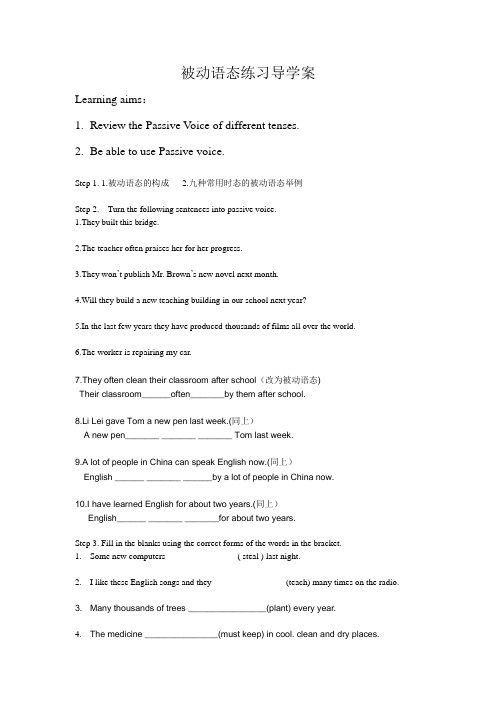
被动语态练习导学案Learning aims:1.Review the Passive V oice of different tenses.2.Be able to use Passive voice.Step 1. 1.被动语态的构成 2.九种常用时态的被动语态举例Step 2. Turn the following sentences into passive voice.1.They built this bridge.2.The teacher often praises her for her progress.3.They won’t publish Mr. Brown’s new novel next month.4.Will they build a new teaching building in our school next year?5.In the last few years they have produced thousands of films all over the world.6.The worker is repairing my car.7.They often clean their classroom after school(改为被动语态)Their classroom______often_______by them after school.8.Li Lei gave Tom a new pen last week.(同上)A new pen_______ _______ _______ Tom last week.9.A lot of people in China can speak English now.(同上)English ______ _______ ______by a lot of people in China now.10.I have learned English for about two years.(同上)English______ _______ _______for about two years.Step 3. Fill in the blanks using the correct forms of the words in the bracket.1.Some new computers ________________( steal ) last night.2.I like these English songs and they ________________ (teach) many times on the radio.3. Many thousands of trees ________________(plant) every year.4.The medicine _______________(must keep) in cool. clean and dry places.5..When and where to build the new factory __________________(not decide) yet.6. 6. .Please wait a minute. Your bike __________________(mend) now.Step 4. 用动词的正确时态、语态填空:Our desks and chairs _____________ (make) of wood. The paper of books and newspapers _____ also _______ (make) from wood. Even some kinds of cloth __________ (make) from it. Many people _______ (burn) wood to keep themselves warm in winter. Indeed, wood ______(be) important in our everyday life.Where______ wood ________(come) from? It __________ (take) from trees which ________(grow) in the mountains. _____ you _______ (know) how it _____ (get) to us from the mountains?First of all, trees________(cut) down when they _____________(grow) big enough. Then their branches __________ (cut) off, and logs___________(make).These heavy logs __________(put) together in different ways and ______ (take) down to the foot of the mountains. Some of them _________ (float使漂流) down the small rivers and others___________ (carry) down on trains.Big trees ___________(cut) down in the mountains every year. Then young ones _______________ (must, plant) so that we ______ always______ (can, have) enough wood. We have to take good care of mountains so that they _____ always ________ (may, cover) with growing trees.Step 5.Translate the following sentences:1.台湾属于中国.2.韩寒的书很畅销.3.这录音机不转.4.火灾是怎样发生的?5.这个问题值得讨论.6.这种布摸起来很柔软.Step 6. Summing upStep 7. Homework:Complete all the exercises Typed in the paper.。
人教版九年级英语专题复习导学案:被动语态
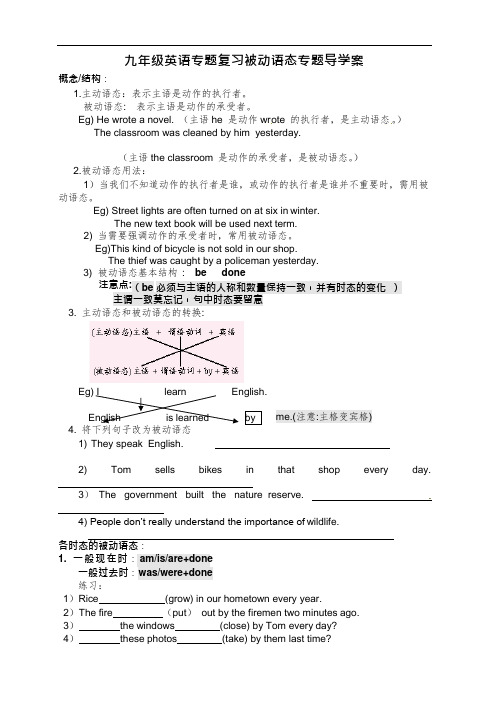
(be 必须与主语的人称和数量保持一致,并有时态的变化 )English is learned概念/结构: 九年级英语专题复习被动语态专题导学案1.主动语态:表示主语是动作的执行者。
被动语态: 表示主语是动作的承受者。
Eg) He wrote a novel. (主语 he 是动作 wrote 的执行者,是主动语态 。
)The classroom was cleaned by him yesterday.(主语 the classroom 是动作的承受者,是被动语态。
)2.被动语态用法:1)当我们不知道动作的执行者是谁,或动作的执行者是谁并不重要时,需用被 动语态。
Eg) Street lights are often turned on at six in winter.The new text book will be used next term. 2) 当需要强调动作的承受者时,常用被动语态。
Eg)This kind of bicycle is not sold in our shop.The thief was caught by a policeman yesterday.3) 被动语态基本结构 : be done注意点: 主谓一致莫忘记,句中时态要留意3. 主动语态和被动语态的转换:Eg) Ilearn English. me.(注意:主格变宾格)4. 将下列句子改为被动语态 1) They speak English.2) Tom sells bikes in that shop every day.3) The government built the nature reserve.4) People don’t really understand the importance of wildlife.各时态的被动语态:1. 一般现在时:am/is/are+done一般过去时:was/were+done练习:1)Rice (grow) in our hometown every year.2)The fire (put ) out by the firemen two minutes ago.3) the windows (close) by Tom every day?4) these photos (take) by them last time?by5)How often a meeting (hold) in your company ?2.情态动词的被动语态:情态动词+be done练习:1)He must (take)to hospital. 2)Homework may (not hand) in tomorrow.3)Thousands of trees should (grow)on each side of the road. 4)Should the bottle (shake) before the medicine is taken?5)When should the work (finish)?3.一般将来时:will/shall+ be done am/is/are going to+ be done1)Many people (invite) to our show tomorrow.2)A party (organize) b y our school tonight.3)the meeting (hold) in the hall next week?4)all the roads (cover) with snow tomorrow morning?4. 现在完成时:have/has been done特殊句型被动:1. make/ hear/ see sb do sth-----be made/ heard/ seen to dohear/ see sb doing sth-----be heard/seen doing2. 主动语态中动词+双宾语的① give sb st h----- sth be given to sbshow sb sth--- sth be shown to sblend sb sth--- sth be lent to sbpass sb sth--- sth be passed to sbsend sb sth--- sth be sent to sb② buy sb sth--- sth be bought for sbget sb sth --- sth be got for sbmake sb the--- sth be made for sb3. 尾巴上的介词不能丢1)和老人讲话应该要有礼貌.The old sh o uld .2)应该好好地照顾那些病人.The sick should3)残疾人不应该受到歧视/讥笑.The disabled shouldn’t.4. 含有宾补(位置不变)1) We call him Jim.2) We should make our to wn stronger.3) I found the dog dead.无被动:1) 不及物动词/ 一些短语appear/ disappear/ die/failhappen/take place/ break out/ break down/ belong to /come out2) 系动词be/ feel/ sound/ look/smell/taste 3)当此动词表示事物的自然属性的时候wash well/easily, sell well, wear well (耐穿),grow well, write well, read well六.被动在主将从现中的应用:1. You can go out if your homework (finish).2. You should stand up if you (ask).3. Your mother will be angry if your ho m ework (finish).4. Our town will be more beautiful if more trees (plant).5. It won’t take a long time if the bridge (build).巩固练习一、选择题( )1. a new library in our school last year?A. Is; builtB. Was; builtC. Does; buildD. Did ; build ( )2. An accident on this road last week.A. has b een happenedB. was happenedC. is happenedD. happened ( )3.Cotton(棉花)in the southeast of China.A. is grownB. are grownC. growsD. grow( )4.So far, the moon by man already.A. is visitedB. will be visitedC. has been visitedD. was visited ( )5.A talk on Chinese history in the school hall next week.A. is givenB. has been givenC. will be givenD. gives( )6.How many trees this year?A. are plantedB. will plantC. have been plantedD. planted ( )7.A lot of things by people to save the little girl now.A. are doingB. are being doneC. has been doneD. will be done ( )8.--When this kind of computers_ ? --Last year.A. did; useB. was; usedC. is; usedD. are; used ( )9.The Great Wall all over the world.A. knowsB. knewC. is knownD. was known ( )10.Who this book ?A. did; wr i ttenB. was; written byC. did; writtenD. was; written ( )11.A story by Granny ye sterday.A. was told usB. was told to usC. is told usD. told us ( )12.The monkey was seen off the tree.A. jumpB. jumpsC. jumpe dD. to jump ( )13.The school bag behind the chair.A.putsB. can be putC. can be puttedD. can put ( )14.Older people well.A. looks afterB. must be looked afterC. must look afterD. looked after ( )15.Our teacher carefully.A. should be listened toB. should be listenC. be listenedD. is listened二、用括号内所给动词的正确形式填空。
初中英语被动语态精品导学案3(教师版)
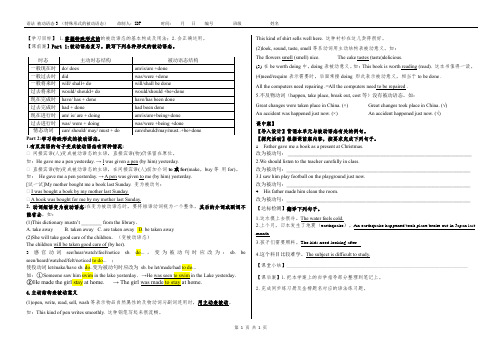
语法 被动语态3 (特殊形式的被动语态) 命制人:ZDF 时间: 月 日 编号 班级 姓名第 1 页 共 1 页【学习目标】 1.掌握特殊形式的的被动语态的基本构成及用法;2.会正确运用。
【课前案】Part 1:被动语态复习。
默写下列各种形式的被动语态。
1.有双宾语的句子变成被动语态有两种情况:① 间接宾语(人)变成被动语态的主语,直接宾语(物)仍保留在原位。
如:He gave me a pen yesterday. → I was given a pen (by him) yesterday.① 直接宾语(物)变成被动语态的主语,在间接宾语(人)前加介词to 或for (make ,buy 等 用for)。
如: He gave me a pen yesterday. → A pen was given to me (by him) yesterday. [试一试]My mother bought me a book last Sunday. 变为被动句: ① I was bought a book by my mother last Sunday.① A book was bought for me by my mother last Sunday.2. 动词短语变为被动语态:在变为被动语态时,要将短语动词视为一个整体,其后的介词或副词不能省去。
如:(1)This dictionary mustn’t ________ from the library .A. take awayB. taken awayC. are taken awayD. be taken away (2)She will take good care of the children .(变被动语态) The children will be taken good care of (by her).3. 感官动词see/hear/watch/feel/notice sb. do...,变为被动句时应改为:sb. be seen/heard/watched/felt/noticed to do... ;使役动词let/make/have sb. do..变为被动句时应改为如:①Someone saw him swim in the lake yesterday . ②He made the girl stay at home. 4.主动结构表被动意义(1)open, write, read, sell, wash 等表示物品自然属性的及物动词与副词连用时,用主动表被动。
《被动语态》 导学案

《被动语态》导学案一、学习目标1、理解被动语态的概念和构成。
2、掌握不同时态下被动语态的形式和用法。
3、能够正确地将主动语态转换为被动语态,并在实际语境中运用。
二、知识要点(一)被动语态的概念被动语态表示主语是动作的承受者,即行为动作的对象。
例如:“The book was written by him”(这本书是他写的。
)在这个句子中,“book”是“write”这个动作的承受者。
(二)被动语态的构成被动语态由“be +过去分词”构成。
其中,“be”根据时态的不同而变化,过去分词则保持不变。
(三)不同时态的被动语态形式1、一般现在时:am/is/are +过去分词例如:“The room is cleaned every day”(这个房间每天都被打扫。
)2、一般过去时:was/were +过去分词例如:“The tree was cut down yesterday”(这棵树昨天被砍倒了。
)3、一般将来时:will be +过去分词或 be going to be +过去分词例如:“The meeting will be held next week”(会议将在下周举行。
)4、现在进行时:am/is/are being +过去分词例如:“The problem is being discussed now”(这个问题正在被讨论。
)5、过去进行时:was/were being +过去分词例如:“The house was being built at that time”(那时候房子正在被建造。
)6、现在完成时:have/has been +过去分词例如:“The work has been finished”(工作已经完成了。
)7、过去完成时:had been +过去分词例如:“The task had been completed before he came”(在他来之前任务已经完成了。
被动语态的导学案
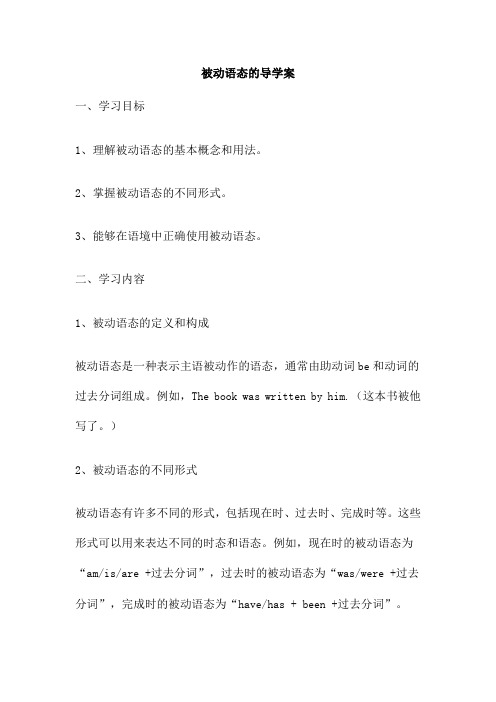
被动语态的导学案一、学习目标1、理解被动语态的基本概念和用法。
2、掌握被动语态的不同形式。
3、能够在语境中正确使用被动语态。
二、学习内容1、被动语态的定义和构成被动语态是一种表示主语被动作的语态,通常由助动词be和动词的过去分词组成。
例如,The book was written by him.(这本书被他写了。
)2、被动语态的不同形式被动语态有许多不同的形式,包括现在时、过去时、完成时等。
这些形式可以用来表达不同的时态和语态。
例如,现在时的被动语态为“am/is/are +过去分词”,过去时的被动语态为“was/were +过去分词”,完成时的被动语态为“have/has + been +过去分词”。
3、被动语态的用法被动语态可以用来表达以下情况:a)主语是动作的接受者。
例如,“The car was hit by a bus.”(汽车被公交车撞了。
)b)不知道或不需要知道动作的执行者。
例如,“The book was written in 1990.”(这本书在1990年被写了。
)c)为了强调动作的接受者。
例如,“The building was destroyed in the earthquake.”(这座建筑在地震中被毁了。
)三、学习活动1、阅读课文并回答问题阅读课文中关于被动语态的部分,并回答以下问题:a)什么是被动语态?b)被动语态有哪些不同的形式?c)被动语态在什么情况下使用?2、做练习题完成课文中的练习题,包括填空题、选择题和翻译题等,以检验自己对被动语态的理解和掌握程度。
3、小组讨论和交流与小组成员讨论和交流,分享彼此对被动语态的理解和经验,并一起解决学习中遇到的问题。
4、总结和反思回顾学习内容,总结重点和难点,反思自己的学习成果和不足之处,并制定改进计划。
四、学习成果评估1、课堂表现评估在课堂上积极参与讨论和回答问题,表现出对被动语态的理解和掌握程度。
2、作业评估按时完成作业,包括课文中的练习题和其他相关练习,以检验自己对被动语态的掌握程度。
被动语态 导学案
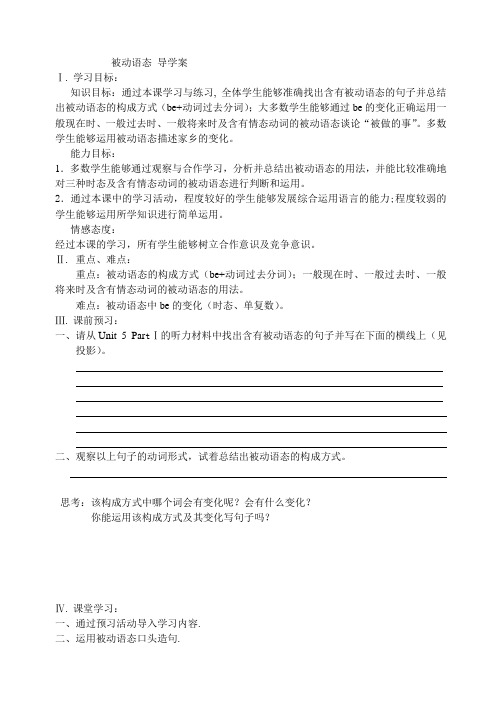
被动语态导学案Ⅰ. 学习目标:知识目标:通过本课学习与练习, 全体学生能够准确找出含有被动语态的句子并总结出被动语态的构成方式(be+动词过去分词);大多数学生能够通过be的变化正确运用一般现在时、一般过去时、一般将来时及含有情态动词的被动语态谈论“被做的事”。
多数学生能够运用被动语态描述家乡的变化。
能力目标:1.多数学生能够通过观察与合作学习,分析并总结出被动语态的用法,并能比较准确地对三种时态及含有情态动词的被动语态进行判断和运用。
2.通过本课中的学习活动,程度较好的学生能够发展综合运用语言的能力;程度较弱的学生能够运用所学知识进行简单运用。
情感态度:经过本课的学习,所有学生能够树立合作意识及竞争意识。
Ⅱ. 重点、难点:重点:被动语态的构成方式(be+动词过去分词);一般现在时、一般过去时、一般将来时及含有情态动词的被动语态的用法。
难点:被动语态中be的变化(时态、单复数)。
Ⅲ. 课前预习:一、请从Unit 5 Par tⅠ的听力材料中找出含有被动语态的句子并写在下面的横线上(见投影)。
二、观察以上句子的动词形式,试着总结出被动语态的构成方式。
思考:该构成方式中哪个词会有变化呢?会有什么变化?你能运用该构成方式及其变化写句子吗?Ⅳ. 课堂学习:一、通过预习活动导入学习内容.二、运用被动语态口头造句.三、总结被动语态用法,完成下面表格。
Ⅴ.练习:一、用所给动词及时间,运用被动语态描述图片(见投影)。
1. build, in 20052. write, Lu Xun3. trees, plant, every year/last year/ next year4. clean, yesterday/every afternoon/this afternoon5. must, read, every day,二、小组竞赛活动,运用被动语态描述图片(用尽可能多的动词及时态)三、Writing: 我的家乡近几年变化很大,请根据图片及提示词,以Changes in myhometown 为题,写一篇关于家乡变化的文段,并表达你对此的感受。
被动语态导学案

被动语态导学案课题被动语态学习目标与考点分析学习目标:熟练掌握被动语态的用法,特别是常用时态的被动语态和情态动词被动语态;熟练掌握主动形式表示被动意义用法。
考点分析:被动语态为初中英语语法重点和难点,是历年中考必考知识点。
学习重点被动语态与时态结合用法;主动表被动用法。
学习方法讲练结合讲问结合教学步骤提前预习、自主学习、问题探究、展示交流、问题生成、处理练习、谈论收获/反思学习内容与过程提前预习一、英语中的语态1)主动语态和被动语态:英语动词有两种语态,即主动语态(The Active V oice)和被动语态(The PassiveV oice)。
主动语态表示主语是动作的执行者,被动语态表示主语动作的承受者。
如:Many students study English.(主动语态)English is studied by many students.(被动语态)2)被动语态的结构:被动语态由“助动词be+及物动词的过去分词”构成,助动词be有人称、数的变化,其变化规则与be作为连系动词时一样。
自主学习二、被动语态be + 过去分词(及物动词)被动语态是英语动词的一种特殊形式. 汉语中往往用“被”“受”“给”等词来表示被动意义.主动语态变为被动语态的方法:1 . 主动句中的宾语变成被动句的主语.2 . 主动句中的谓语动词变成被动句的be + 过去分词.3 . 主动句中的主语变成被动句by的宾语, 放在谓语动词后面. 如果不强调动作执行者时, by 短语可省略.例句1.He plants trees in spring.2.His brother washes bowls every day.3.Tom cleans the room every week.问题探究主动语态变为被动语态1.They make shoes in that factory.(主语+及物动词+宾语)2. They bought ten computers last term.3. Amy can take good care of Gina .三、常用的被动语态结构时态结构一般现在时am/is/are+p.p.一般过去时was/were+p.p.注意:情态动词的被动语态结构为:情态动词+be+过去分词问题生成四、主动语态变成被动语态时要注意以下几点:1 . 含有双宾语的主动句变成被动句时, 可以将其中一个宾语变为主语, 另一个不动. 一般把间接宾语变为主语.如: Mary gave me a pen .I was given a pen by Mary .如果把直接宾语变为主语, 则在间接宾语前加“ to \for”如: A pen was given to me by Mary .2 .含有复合宾语的主动句变为被动句时, 将其中的宾语变为主语, 宾补不变.如: We asked him to speak at the meeting .He was asked to speak at the meeting .3 . 如果主动句中的谓语是短语动词, 变为被动句时, 短语动词的介词或副词不可以丢掉.如: They took good care of the boys .The boys were taken good care of .4 . 在“ let , make , see , hear , notice , watch , feel ”等动词后面做宾语补足语的动词不定式不带“ to ” , 但改成被动句时应加上“ to ” .如: The doctor made me stay in bed for three days . I was made to stay in bed for three days by the doctor . 课堂训练:1 . He tells us a story every evening .2. He bought me a new bike yesterday.3 . Can he take his sister to the park ?4 . He found out the lost key .5. The boss made him do the heavy work.6. We often hear him play the guitar.五、不用被动语态的动词:1. 不及物动词(vi.) 如:happen, take place, appear, dissapear, …A traffic accident ________(happen) just now.2. 连系动词(Link.v.) 如:be, look, seem, feel, sound, smell, taste, get, turn,become…Peking Opera ________ (sound) beautiful.3. 当此动词表示事物的自然属性的时候:The pen _________ (write) very fast.This kind of sweater _______ (sell) well.课堂训练:1)Teenagers should _____ (allow) to go out at night.2)The telephone _____ (invent) by Bell.3) English ____ (speak) in China.4) The car ____ (make) in China.5) The room must _____ (clean) every day.课后反思:。
被动语态导学案

被动语态(Passive Voice)导学案一、分清动作的执行者和动作的承受者1.We cleaned the classroom yesterday.(昨天我们打扫了教室。
)2.The classroom was cleaned by us yesterday.(昨天教室被我们打扫了。
)二、被动语态的定义:语态(voice)是个语法范畴,它是一种动词形式,表示动词的主语与该动词所表示的动作之间的________和________关系。
当主语是动作的_________时,动词用主动语态(Active V oice);如果主语是动作的__________,动词便用被动语态(Passive V oice)。
三、被动语态的一般结构:动词的被动语态由“________________+_________________”构成,即:be+done。
当主动句变为被动句时,原来的宾语变成了主语,原来的主语变成了介词by的宾语。
主动句与被动句的结构虽然不同,但动作的执行者和承受者的关系并没有改变。
eg. We speak English. (主动语态)English_______________________________________(被动语态)四、各种时态的主动语态和被动语态结构:时态主动语态被动语态1.一般现在时do; does2.一般过去时did3.一般将来时will/shall do4.过去将来时would do5.现在进行时am/is/are doing6.过去进行时was/were doing7.现在完成时have/has done8.过去完成时had done请把下列主动语态的例句变成被动语态:1.He reads the story book every morning.2.He read the story book yesterday3.He will read the story book tomorrow.4.He said he would read the story book.He said5.He is reading the story book now.6.He was reading the story book this morning.7.He has read the story book for 2 days.8.He had read the story book before his father came in.五、一般将来时的其他常见的被动语态形式一般将来时的主动语态形式一般将来时的被动语态形式be going to do be going to be donebe to do be to be donebe about to do be about to be doneeg.1.They are going to pull down the old library soon.2.He is going to publish his new book next month.3.We are to finish the task in ten minutes.4.The worker is about to paint the wall.六、含有双宾语的主动句的转换I gave the book to Mr. Smith yesterday. (昨天我给了史密斯先生一本书。
被动语态(一)导学案 人教版英语九年级全册

被动语态(一)一般现在时被动语态导学案一、课前预习一)写一写。
你还记得八年级学过的现在完成时吗?请写出下列动词的过去分词。
make _____________ use _____________ speak_____________ allow ___________clean_____________ grow_____________ play ______________take______________check_____________ give _____________ hold______________ cut______________ 二)试一试。
将下面句子翻译成中文,请注意划线部分的理解。
1)The ring is made of gold.中文:_________________________________2)The chopsticks are made in China.中文:_________________________________3)Basketball is played in our school.中文:_________________________________二、课中学习一)初识被动语态●英语语态。
英语中有两种语态:主动语态和_______________。
英语的语态是通过动词形式的变化表现出来的。
※主动语态表示主语是动作的执行者。
例如:Many people speak English.主语people 是动词speak 的_____________.※被动语态表示主语是动作的承受者。
例如:English is spoken by many people.主语English 是动词speak的_________________.●被动语态的用法※不知道或没有必要说明动作的执行者是谁。
The car is made in China. (车子肯定是“人”制造的,没有必要说明是谁制造的)Some new computers were stolen last night. (不知道电脑是谁偷的)※强调动作的承受者,而不强调动作的执行者。
被动语态导学案
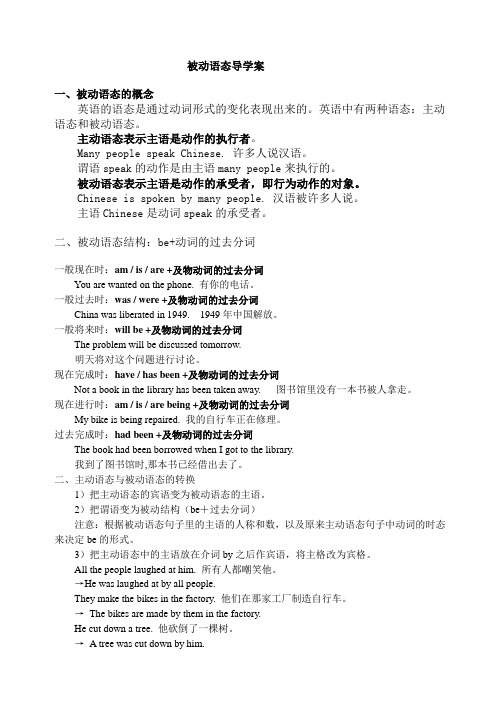
被动语态导学案一、被动语态的概念英语的语态是通过动词形式的变化表现出来的。
英语中有两种语态:主动语态和被动语态。
主动语态表示主语是动作的执行者。
Many people speak Chinese. 许多人说汉语。
谓语speak的动作是由主语many people来执行的。
被动语态表示主语是动作的承受者,即行为动作的对象。
Chinese is spoken by many people. 汉语被许多人说。
主语Chinese是动词speak的承受者。
二、被动语态结构:be+动词的过去分词一般现在时:am / is / are +及物动词的过去分词You are wanted on the phone. 有你的电话。
一般过去时:was / were +及物动词的过去分词China was liberated in 1949.1949年中国解放。
一般将来时:will be +及物动词的过去分词The problem will be discussed tomorrow.明天将对这个问题进行讨论。
现在完成时:have / has been +及物动词的过去分词Not a book in the library has been taken away.图书馆里没有一本书被人拿走。
现在进行时:am / is / are being +及物动词的过去分词My bike is being repaired. 我的自行车正在修理。
过去完成时:had been +及物动词的过去分词The book had been borrowed when I got to the library.我到了图书馆时,那本书已经借出去了。
二、主动语态与被动语态的转换1)把主动语态的宾语变为被动语态的主语。
2)把谓语变为被动结构(be+过去分词)注意:根据被动语态句子里的主语的人称和数,以及原来主动语态句子中动词的时态来决定be的形式。
被动语态英语导学稿Word 文档 (3)

英语导学案课题:复习被动语态四间房二中李素花2013-4-9学习目标:1.掌握各种时态的被动语态的结构2.能够正确的把主动语态变为被动语态3.掌握被动语态的各种特殊用法重难点:被动语态的几种特殊用法课前准备:1. 掌握动词的过去式及过去分词的变化规则2.学习、对比主动及被动语态的各种时态的构成课内探究案I 思考一:各种时态的被动语态的结构1). 一般现在时:______________________________________________2). 一般将来时:______________________________________________3). 现在进行时:______________________________________________4). 现在完成时:______________________________________________5). 过去完成时:______________________________________________6). 含情态动词:_______________________________________________练习巩固:用所给动词的适当形式填空1.Basketball_______________(play) by many people in China.2. A new building __________________ (build) in our school next year.3.Your school bag _______________ (must not put) there.4、When I got there,all the books _____________________(sell) out.5、The road _______________(repair) now.6、So far, many man-made satellites _______________(send) up into the space.II. 思考二:怎样把一个句子由主动语态变为被动语态?1.They plant trees in spring every year.2.We will have an English class tomorrow.3.They have finished their homework.III. 思考三:不用被动语态的动词:1. 不及物动词(vi.) 如: happen, take place, appear, disappear …A traffic accident ________(happen) just now.2.连系动词(Link.v.) 如:be, look, seem, feel, sound, smell, taste, get, turn, become…Peking Opera ________ (sound) beautiful.3. 当此动词表示事物的自然属性的时候:The pen _________ (write) very fast.This kind of sweater _______ (sell) well.IV. 思考四:几个特殊动词如see, hear, watch, make, let, have等,在主动句中其后面的不定式省to,但变成被动时,to要加上去,不能省略。
初中英语被动语态导学案1(教师版)

【达标检测】
Task1:用被动语态翻译下列句子。
1.这块手表是中国制造的。This watch is made in China.
2.每年都应该种更多的树。More trees should be planted every year.
2. Robots will do many kinds of work. ___________________________________________________
3. They built a new bridge over the river last year.____________________________________________________
6.The students asked the teacher to tell a story just now.________________________________________________
7.Adults should allow teenagers to choose their own clothes.
一般将来时时的被动语态形式shall/will be +done
4) 含有情态动词的被动语态
We may plant trees in spring.(主动)Trees may be planted in spring.(被动)
We must keep classroom clean.(主动)Classroom must be kept clean by us.(被动)
- 1、下载文档前请自行甄别文档内容的完整性,平台不提供额外的编辑、内容补充、找答案等附加服务。
- 2、"仅部分预览"的文档,不可在线预览部分如存在完整性等问题,可反馈申请退款(可完整预览的文档不适用该条件!)。
- 3、如文档侵犯您的权益,请联系客服反馈,我们会尽快为您处理(人工客服工作时间:9:00-18:30)。
被动语态
【语言感知】将下列句子译成汉语
①The Great Wall was built more than 2000 years old.
② A new bridge is being built across the Changjiang River.
③The project will (is going to) be finished next month.
④Many trees have been planted around the lake.
⑤Old people should be taken care of/looked after.
⑥Books can’t be taken out of the library.
⑦A gift was given to me on my birthday.
⑧What are the shirts made of ? Are they made of cotton? Where were they made?
⑨As far as I know, tea plants are grown on the sides of mountains.
⑩The painting isn’t made from grass.
【合作探究】
一、英语动词有两种语态:主动语态和被动语态。
当我们不知道谁是动作的执行者, 或者只需强调动作的承受者时,要用被动语态.
二、基本结构:be + 过去分词(PP) + (by …)
不同时态下的被动语态
注意:see, watch, hear, notice, feel, make, listen to, look at等动词/短语后作宾语补语的不定式都不带to;但改成被动语态后必须带to。
常用结构Be seen to do, be made to do, be heard to do, be watched to do。
※He is often heard to play the guitar.
三、主动式表被动的几种特殊情况:
1.动词(表示主语的属性特征) + 副词(well/ badly/easily/smoothly),用主动式表被动义。
read, write, sell, wash, clean, wear, lock, open, cook, shut, dry, eat, drink,…
※The books sell well.This kind of cloth washes easily.
2.不定式在某些形容词后作状语,且和句子的主语(或宾语)构成动宾关系时,用主动式表被动义。
difficult, easy, hard,
fit, pleasant, good, comfortable, light, heavy, safe,…
※The fish is not fit to eat (eat).We find English is hard _______ (learn).The article is difficult ___________ (understand).
3.不定式作后置定语,与被修饰的名词构成动宾关系,又和该句主语(或宾语)构成主谓关系时,用主动式表被动义。
※I have a lot of homework ______(do).I’ll give him some books ______ (read).
4.表示状态特征的连系动词+adj./n.,用主动式表被动义。
(look, sound, feel, smell, taste, prove, appear, make,...)
※The steel feels cold.
5.表示“开始、结束、运动”的动词用主动式表被动义。
(begin, open, start, stop, end, finish, shut, move, run,...)
※The shop opens at 6 am. every day
6.作“需要”讲的want/need/require后接动名词作宾语时,用主动式表被动义;当然也可接不定式的被动式作宾语。
※Your jacket needs washing/ to be washed.The book is worth reading.
【当堂检测】
一、用括号内所给动词的正确形式填空。
(1×10=10分)(请注意时态和语态两个方面
............)
1.It's said(据说) that the long bridge______________(build)in two months.
2.Where to have the meeting ______________ (discuss)now.
3.Which language _______the most widely_______(speak)in the world?
4.The lost boy_____________(not find)so far.
st year a large number of trees______________(cut)down.
6. The students _____ often _____(tell) to take care of their desks and chairs.
7. The old man is ill. He ______ (must send) to the hospital.
8. Vegetables, eggs and fruits_________ (sell) in this shop.
9. What _______ knives ______ (make) of ? They_______________(make) of metal(金属) and wood.
10. Can the magazine ________ (take) out of the library?
11. The room _____________ (clean) by me every day.
12. The stars can’t _____________ (se e) in the daytime.
13. Some flowers _______________ (water) by Li Ming already.
14. This kind of shoes __________ (sell) well.
15. How long _____ your uncle ______(be) in the city?
16. The food _____________ (smell) delicious.
17.We find English isn’t hard _______ (learn).
三、按要求改写下列句子,一空一词。
1.Is tea grown in South China?(改为主动语态)
_______ people _________ tea in South China?
2.I am given a birthday present by my parents every year.(同义句转换)
A birthday present _______ _______ _______ _______by my parents every year.
3.The work is going to be finished in two days. (对划线提问)
How_______ _______ the work going to be finished ?
4. The children will sing an English song. (改为被动语态)
An English song ______ ______ _______ by the children.
5. You needn't do it now. (改为被动语态)
It ______ ________ ________ by you now.
答案:一、1.will be built 2. is being discussed 3. is spoken 4. hasn’t been found 5. were cut 6.are told 7. must be sent 8. are sold 9.are made , are made 10. be taken 11.is cleaned 12. be seen 13. have been watered 14. sells 15. has been 16. smells 17.to learn
二、1.Do, grow 2. is given to me 3.soon is 4. will be sung 5. needn’t be done。
